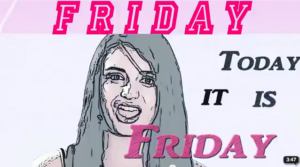 In his recent, final Poptimist column for Pitchfork – an online music magazine with a mixed reputation – Tom Ewing, one of two music critics I read on Pitchfork (the other one is Nitsuh Abebe), introduced me to the concept of the “trollgaze,” something I was aware of but didn’t have a name for.
In his recent, final Poptimist column for Pitchfork – an online music magazine with a mixed reputation – Tom Ewing, one of two music critics I read on Pitchfork (the other one is Nitsuh Abebe), introduced me to the concept of the “trollgaze,” something I was aware of but didn’t have a name for.
Maura Johnston, the Village Voice’s music editor, coined the phrase to describe Internet things that attract negative attention or, to put more directly, things you watch/read/listen to because you know they are going to be bad. The badness is what you came for. Rebecca Black’s “Friday,” which Ewing uses as an example, is the best example of an object of the trollgaze.
Ewing describes trollgaze as “web-native” (which I could contest if I wanted to disclose how many hours I spent watching Supermarket Sweep during high school, but he’s mostly right). He situates it in the music world, as he’s writing for a music blog, but the trollgaze occurs in all genres of web things. Take the Slate article that attracted the book world’s attention last weekend: Farhad Manjoo’s response to Richard Russo’s anti Price Check App New York Times op-ed, headlined, “Don’t Support your Local Bookstore.”
How many hits did Slate get last week from people reading “Don’t Support your Local Bookstore” who knew, before they read the article, that they were going to be outraged? Who read the article knowing they were going to give it negative attention? Tons, probably. I read the article after hearing Internet chatter about the content so I knew I was reading something I would not just disagree with but also vehemently reject.
Hits are hits are hits. Does it matter how and why they come in? No. Probably not. Slate gets paid if lots of people look at their site, no matter what the reason. Rebecca Black co-stared in a Katy Perry music video (I’m not linking to that, it’s shitty [ed. note: not true!]) and got to record a second, terrible single (ibid). Attracting the trollgaze is a form of success.
Even if Manjoo’s intention wasn’t to attract trollgazers, that headline “Don’t Support Your Local Bookstore,” – during a time when the bookselling and bookpublishing and bookreading community was reacting against Amazon’s Price Check App and shouting very loudly and clearly “Support Your Local Bookstore!” – was very much intended to appear shocking and controversial. Have all attempts at controversial writing on the Internet become some form of asking for trollgazing? (Asking for negative attention in exchange for hits, which = $$$). Yes. Maybe. Probably.
This post may contain affiliate links.








